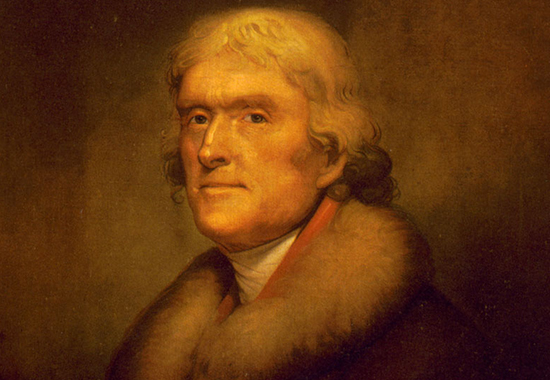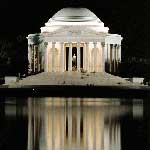|

Thomas Jefferson 1743-1826
Thomas Jefferson was the third president of the U.S. from 1801 until
1809.
|
|
Image Above
Thomas Jefferson
Print,
reproduction of the 1805 Rembrandt Peale
painting of Thomas Jefferson held by the New
York Historical Society
Library of
Congress |
Before becoming president, Thomas Jefferson served as secretary of
state from 1789 until 1794 and as vice president from 1797 until
1801.
In 1797, the
 XYZ Affair and the resulting
XYZ Affair and the resulting
 Quasi
War ensued. Quasi
War ensued.
On March 4, 1801, Thomas Jefferson
took a walk to his swearing-in ceremony and delivered his
 Inaugural Address
at the Senate Chamber, U.S. Capitol, Washington D.C.
Inaugural Address
at the Senate Chamber, U.S. Capitol, Washington D.C.
Thomas Jefferson's
Family
Jefferson's father was
Peter Jefferson.
His mother was Jane
Randolph Jefferson.
The woman in Jefferson's life was
Martha Wayles
Skelton, whom he married in 1772. Martha died in 1782.

Thomas Jefferson's
Highlights
Jefferson is most famous for his drafting of the
 Declaration of
Independence.
Declaration of
Independence.
The
 Louisiana Purchase was made during his term.
Louisiana Purchase was made during his term.
Thomas Jefferson was a quiet man with
a rather shy personality.
He was founder of the
 University of
Virginia. The year? 1819.
University of
Virginia. The year? 1819.
Here is
 Jefferson's opinion of the Missouri Compromise
of 1820.
Jefferson's opinion of the Missouri Compromise
of 1820.

Thomas Jefferson
memorial
You are welcome to visit the
 Jefferson
Memorial in Washington, D.C. It was dedicated on
April 13, 1943, at the 200th
anniversary of his birth.
Jefferson
Memorial in Washington, D.C. It was dedicated on
April 13, 1943, at the 200th
anniversary of his birth.
Thomas Jefferson
Controversy
Thomas Jefferson became famous as an advocate for
liberty. At the same time he received criticism for his racial
views.
Here is an excerpt from the New
York Times article The Real Thomas Jefferson - The Monster of
Monticello, from November 30, 2012:
There
is, it is true, a compelling paradox about
Jefferson: when he wrote the Declaration of
Independence, announcing the "self-evident"
truth that all men are "created equal," he
owned some 175 slaves. Too often, scholars
and readers use those facts as a crutch, to
write off Jefferson’s inconvenient views as
products of the time and the complexities of
the human condition.
[...]
Rather
than encouraging his countrymen to liberate
their slaves, he opposed both private
manumission and public emancipation. Even at
his death, Jefferson failed to fulfill the
promise of his rhetoric: his will
emancipated only five slaves, all relatives
of his mistress Sally Hemings, and condemned
nearly 200 others to the auction block. Even
Hemings remained a slave, though her
children by Jefferson went free.
[...]
Jefferson told his neighbor Edward Coles not
to emancipate his own slaves, because free
blacks were "pests in society" who were "as
incapable as children of taking care of
themselves." And while he wrote a friend
that he sold slaves only as punishment or to
unite families, he sold at least 85 humans
in a 10-year period to raise cash to buy
wine, art and other luxury goods.
Destroying families didn’t bother Jefferson,
because he believed blacks lacked basic
human emotions. "Their griefs are
transient," he wrote, and their love lacked
"a tender delicate mixture of sentiment and
sensation."
Jefferson claimed he had "never seen an
elementary trait of painting or sculpture"
or poetry among blacks and argued that
blacks’ ability to "reason" was "much
inferior" to whites’, while "in imagination
they are dull, tasteless, and anomalous." He
conceded that blacks were brave, but this
was because of "a want of fore-thought,
which prevents their seeing a danger till it
be present."
 Read the entire article
Read the entire article
Here is a
 Thomas Jefferson
timeline
Thomas Jefferson
timeline
Check the
 US Election
Map 1796 - 1968.
US Election
Map 1796 - 1968.
Check
 Governments in History Chart.
Governments in History Chart.
More History
|